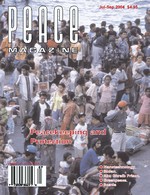
Peace Magazine Jul-Sep 2004, page 30. Some rights reserved.
Search for other articles by Ron Shirtliff here
Wendy Pearlman, New York: Nation Books, 2003. Published in Canada by Thunder's Mouth Press
Power corrupts, not just individuals but whole communities, colonies, nations. We saw it in apartheid South Africa and we see it now in Palestine. Wendy Pearlman in Occupied Voices, illustrates through first-person narratives of ordinary Palestinians just how far the powerful will go in the oppression of the dispossessed.
Harvard based Pearlman is not your usual war journalist. She was born and raised in a Midwestern American Jewish family. She committed herself to the extraordinary pursuit of justice and freedom in school and became the Group Leader of the local Nebraska Chapter of Amnesty International at the tender age of 14. She established her focus on human rights and never looked back until she took on the formidable task in the first month of 2001 (just after the start of the second Intifada) of showing the world exactly what it is like living in occupied Palestinian territories, by letting those who live there every day tell their own stories.
They are not pretty stories. Yet, surprisingly, there is little expression of hate, but rather a repeated determination to carry on and to receive the justice that would allow them to live ordinary lives in an ordinary nation. Each story is selected to focus on particular aspects of the 37-year-long occupation, and is introduced with an informative contextual preface written by Pearlman, all of which together add up to a brief history of the Israeli occupation and the colonization activity of the settlements.
Perlman notes that in year 2000 "Palestinian territory was intersected by Israeli territory such that it was splintered into no less than two hundred discrete fragments of land, the overwhelming majority of these pockets less than two square kilometres in area."
Schoolchildren, teachers, doctors, ambulance drivers, workers, merchants, salesmen, actors, directors, mothers and fathers, all are captive in these tiny areas and may or may not obtain permission to cross Israeli checkpoints to carry on their daily lives within Palestine. Even when successful, each tentative crossing will be time-consuming and humiliating at the hands of arbitrary military personnel. Needless to say, the life stories of most Palestinians include episodes of extreme frustration with checkpoints and extended curfews in their daily lives.
Arbitrary death, injury or imprisonment is another near-universal theme. Leaving your home without your Israeli issued ID card brings a year in prison. Being on your own street when there is an Israeli "action" may well result in your being shot, especially if you are a young male threatening a tank or a helicopter gunship with a slingshot.
As Pearlman reports,
"As the current Intifada approached the end of its second year, over 300 children had been killed. Of these, a third were under the age of twelve. Half were killed by live ammunition and another third by missiles, shelling, or machine-gun fire. Nearly 90 percent were killed in situations unrelated to the occurrence of any armed confrontation."
The bulldozing of houses, (nearly 10,000 since 1967) frequently without warning, usually without explanation, and almost always without compensation, is a favored weapon of the powerful. The destruction of orchards (700,000 trees) and crops is another, not infrequently enacted by Uzi-toting colonizing settlers, armed neighbors who drive freely on roads Palestinians may not use or cross, and who are above the law.
Palestinians are poor, many of them living on less than two dollars a day. Cut off from each other by roadblocks and Israeli red tape, cut off from normal communication with other nations (Palestinians who get abroad to work cannot count on being allowed to re-enter their homeland), cut off from the 80 percent of their water that goes to the colonists, their economy is in a state of disaster with no clear hope of recovery without freedom from their oppressors.
If that were not enough misery, many ordinary Palestinians lack faith that the Palestinian Authority has the integrity to lead them to a better life even if it were freed from the constraints imposed by the Israelis. The people's hope must be found in themselves, in the strength of the human spirit to prevail in the pursuit of justice against corrupt power.
Not pretty stories, but human, and presented by a humane writer, with the warm photographs of Laura Junka.

Peace Magazine Jul-Sep 2004, page 30. Some rights reserved.
Search for other articles by Ron Shirtliff here